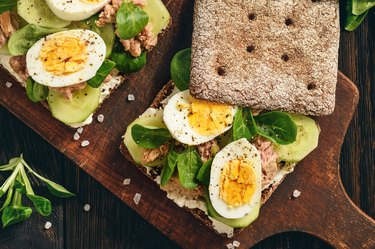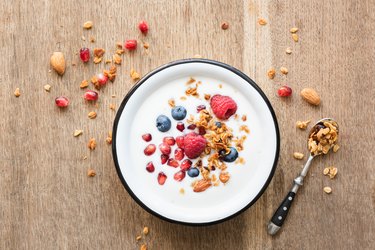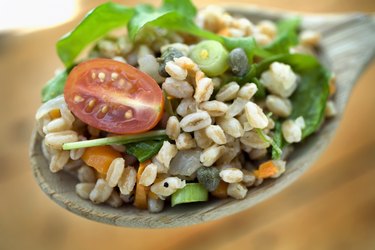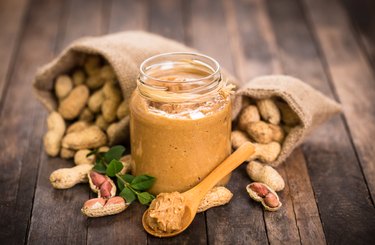
Think of protein as one of your body's most efficient sources of power — premium gas, if you will. And just like you need to visit the gas station frequently to stay on the road, you need to fuel your body with protein to keep every cell humming as it should.
"About 20 percent of our bodies is protein," says Samantha Previte, RD, a dietitian with Find Food Freedom. "Because our bodies don't store protein, it's important that we consume enough daily. Protein in the food we eat is made up of amino acids, and these amino acids are used for all metabolic processes in the body."
Video of the Day
Video of the Day
And when you eat enough of those amino acids, you might just add a spark to your metabolism, according to Michelle Hyman, RD, CDN. You should get 1 to 1.6 grams of protein per kilogram of body weight each day, per a March 2016 study in Food & Function. So a 150-pound person should get between 68 and 109 grams of protein daily depending on their activity level.
"The thermic effect of food (TEF), meaning how many calories you burn digesting your food, appears to vary based on macronutrient content. Protein seems to have the highest percentage, ranging from 15 to 30 percent of the calories burned via digestion. The TEF of carbohydrates is lower at about 5 to 10 percent, while it's lowest for fat at 0 to 3 percent," she says.
"If you want to try to take advantage of TEF for weight loss, it may be wise to incorporate more high-protein foods." But don't overfill that gas tank — eating too much protein may tax the kidneys and cause weight gain.
"Eating protein as part of a balanced diet — one that incorporates both complex carbs and unsaturated fats — is the best way to support a working metabolism," says Rachel Fine, RD of To The Pointe Nutrition. "All three macronutrients (protein, fats and carbs) should be considered as key players towards an optimal working metabolism. Each includes essential nutrients that play roles in energy production, such as B vitamins, which are found in whole grains."
So make the most of every gram without breaking the bank with these high-protein, low-price foods.
1. Lentils
- Cost per serving: $0.37
- Protein per 1/2 cup, cooked: 12 grams
Available canned (for convenience) or dried (for affordability), beans, peas and lentils are incredibly cost-effective and are unique because they're technically a protein and a carbohydrate, Hyman says.
The one-two punch of protein and fiber makes lentils a satisfying dinner addition. They also add resistant starch to your menu, which may help with weight loss thanks to its filling properties, Hyman says.
Buy it: Amazon.com; Price: $3.39 for a 16-ounce bag
2. Low-Fat Cottage Cheese
- Cost per serving: $1.28
- Protein per 1/2 cup: 15 grams
Pegged as one of the best bedtime snacks for metabolism in a November 2019 British Journal of Nutrition study, this mild-flavored dairy product can pack in 10 to 16 grams of protein per 1/2-cup serving, depending on the brand and milkfat content.
Try it solo as a snack, blend into pancake batter, layer in lasagnas or spread onto whole-grain crackers and top with tomatoes. One thing to keep in mind: Because cottage cheese can be high in sodium, "I don't recommend this for those with uncontrolled hypertension," Hyman says.
Buy it: Amazon.com; Price: $5.12 per 16-ounce tub
3. Greek Yogurt

- Cost per serving: $1.59
- Protein per container: 14 grams
Ideal for a grab-and-go breakfast or speedy snack, this dairy is a "do" for both Hyman and Fine. It's portable, rich in bone-building calcium and vitamin D, a good source of gut health-improving probiotics and a stellar base for other nutritious items such as fresh berries, chopped nuts or whole-grain cereal.
Before you start shopping, check out these best high-protein yogurts to buy.
Buy it: Amazon.com; Price: $1.59 per container
4. Shelled Edamame
- Cost per serving: $1.50
- Protein per 2/3 cup: 11 grams
Say yes to edamame (which are immature soybeans) for a budget-friendly, low-sodium and high-fiber nosh.
"Edamame is an excellent source of iron and calcium and makes for a great between-meal snack or pre-dinner appetizer," Fine says. Or try it in soups, stir-fries, poke bowls and pasta tosses. When you can, try to buy soy and soy products organic because soy is one of the top pesticide-sprayed crops.
Buy it: Amazon.com; Price: $2.99 for a 16-ounce bag
5. Chickpeas
- Cost per serving: $0.37
- Protein per 1/2 cup, cooked: 7 grams
Rich in iron, calcium, magnesium, manganese, zinc and vitamin K, the star ingredient in hummus and falafel can help support healthy bones, Fine tells us.
Just like with lentils, dried chickpeas will be the most affordable, but canned can still fit your budget. (Psst... Here's how to cook chickpeas straight out of the can.)
Buy it: Amazon.com; Price: $1.29 per 15.5-ounce can
6. Farro

- Cost per serving: $0.78
- Protein per 1/2 cup, cooked: 7 grams
Like lentils, edamame and beans of all kinds, ancient grains like farro provide a hefty dose of both fiber and protein.
"Farro is a great source of B vitamins, minerals and antioxidants," Fine says, including about 10 percent of your daily value of iron per serving.
A 1/4 cup of dried farro fluffs up to about a 1/2 cup cooked, so scale accordingly for your next grain bowl, whole-grain salad or risotto.
Buy it: Amazon.com; Price: $20.39 for two 24-ounce bags
7. Almonds
- Cost per serving: $0.39
- Protein per 1 ounce (23 nuts): 6 grams
Improve your heart health and speed up weight loss all at once — you can do just that on a low-calorie diet that includes almonds, according to a study in the May 2014 Journal of Research in Medicinal Sciences.
"Almonds are also high in vitamin E, copper and magnesium," Fine says. Snack on a handful for a speedy, satisfying way to refuel; or stir slivers into oatmeal or blend them into the topping for cobblers or crisps.
Buy it: Amazon.com; Price: $10.98 per 25-ounce bag
8. Eggs
- Cost per serving: $0.30
- Protein per large egg: 6 grams
"Eggs have gotten a bad reputation in the past, but they are a great healthy source of protein," Hyman says. Plus, they're affordable when you stock up by the dozen.
And yes, you can eat the yolk! Just limit yourself to an average of one whole egg per day (or seven eggs a week) as they do supply dietary cholesterol, suggest Harvard Health Publishing.
"Boil a bunch of them ahead of time, and store in the fridge for a quick snack or part of breakfast," Hyman says. "Or if you're willing to spend a bit more money and need to save time, buy eggs pre-cooked and peeled at the grocery store."
Buy it: Amazon.com; Price: $3.69 for a dozen
9. Canned Light Tuna
- Cost per serving: $1.79
- Protein per can: 22 grams
High in protein, one can of light tuna contains enough protein for a meal. Plus, canned tuna is deemed a "best choice" for sustainability on the Monterey Bay Aquarium Seafood Watch list. Try choosing light tuna over albacore tuna (aka white tuna) because it contains less mercury, per the Harvard T.H. Chan School of Public Health.
Try it mixed in a salad for a quick lunch or fold the fish into scrambled eggs for a protein boost at breakfast.
Buy it: Amazon.com; Price: $1.79 per can
10. Peanuts

- Cost per serving: $0.20
- Protein per 1 ounce (28 nuts): 7 grams
Right behind hemp and pumpkin seeds, peanuts rank right near the top of the list of highest-protein nuts and seeds, according to the USDA. Bonus: Peanuts are much cheaper than those seeds, too. They're dense in protein and calories — as nuts are high in fat — so stick to a serving of 28 nuts.
Scoop up a spoonful for a mid-morning snack or make peanuts the star of homemade trail mix along with almonds and dried cranberries.
Buy it: Amazon.com; Price: $19.68 for six 16-ounce jars
- Food & Function: “Dietary Protein and Human Health”
- British Journal of Nutrition: “Pre-sleep protein in casein supplement or whole-food form has no impact on resting energy expenditure or hunger in women.”
- Journal of Research in Medicinal Sciences: “The effect of almonds on anthropometric measurements and lipid profile in overweight and obese females in a weight reduction program: A randomized controlled clinical trial.”
- Harvard Health Publishing: "How Many Eggs Can I Safely Eat?"
- Journal of the American College of Nutrition: "The Thermic Effect of Food: A Review"
- Harvard T.H. Chan School of Public Health: "Fish: Friend or Foe?"
- Monterey Bay Aquarium Seafood Watch: "Tuna Recommendations"
- My Food Data: "16 Nuts and Seeds High in Protein"